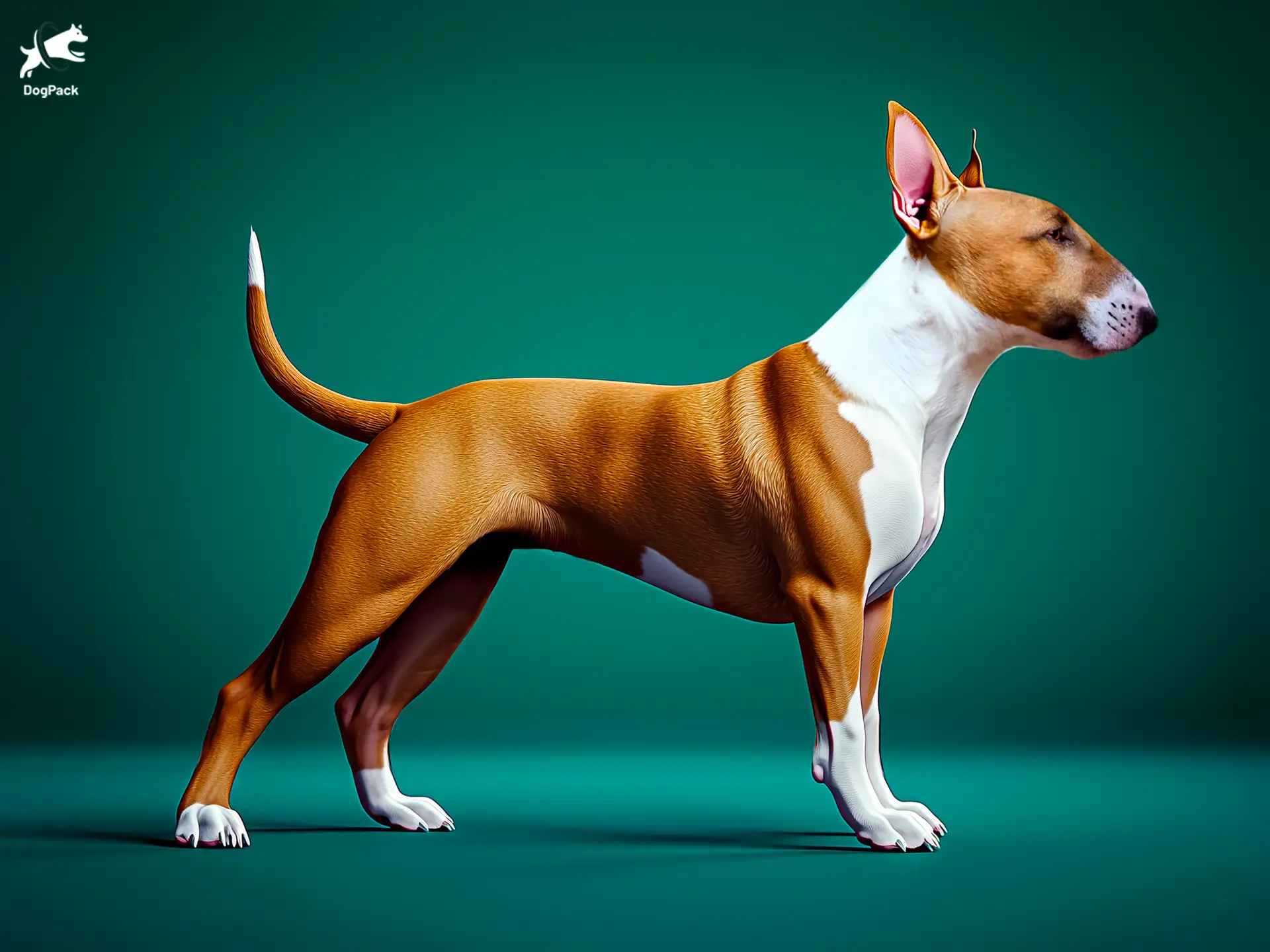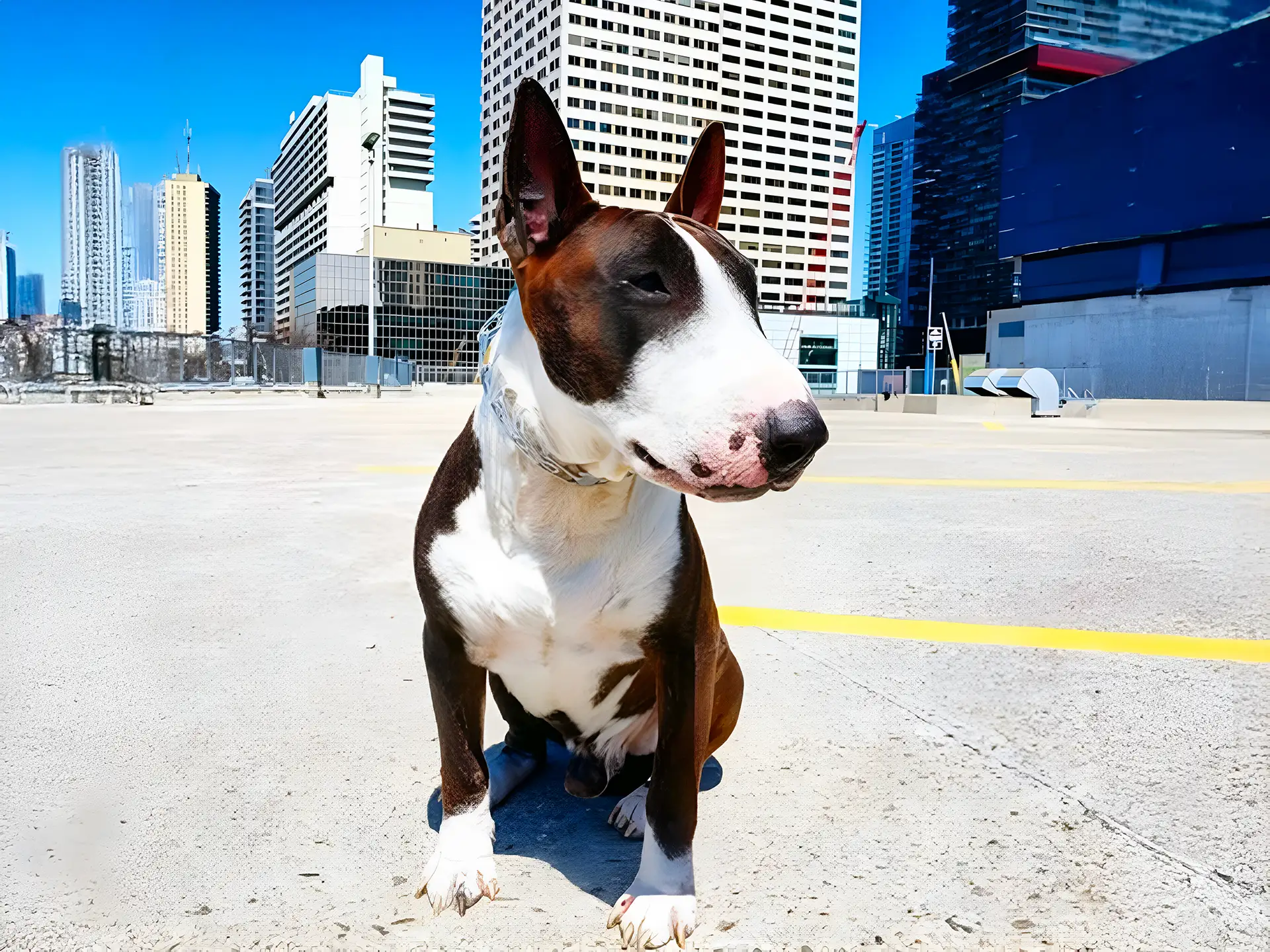Bull Terrier Dog Breed Info & Overview
The Bull Terrier, with its unique egg-shaped head and endearing personality, is a breed full of charm and loyalty. Known for their playful spirit and affectionate nature, these dogs are natural entertainers and devoted companions. Whether it’s an energetic day at the park or a cozy night on the couch, the Bull Terrier brings joy and friendship to every moment.
Characteristics
Pictures
Breed History
The Bull Terrier originated in 19th-century England, initially bred for bull-baiting—a popular but brutal sport at the time. Crossing Bulldogs with the now-extinct White English Terriers produced a dog with both strength and agility. Their unique egg-shaped heads and muscular bodies made them stand out among other breeds.
As bull-baiting became outlawed, Bull Terriers transitioned into fashionable companions for the English elite. They were known as the “Gentleman’s Companion,” admired for their courage and distinctive appearance. The breed’s all-white variety was especially popular during this period.
To improve the breed’s health and introduce more variety, breeders began incorporating colored coats by crossing them with Staffordshire Bull Terriers. Today, Bull Terriers come in both white and colored varieties, maintaining their hallmark traits while appealing to a broader audience.
Temperament, Personality
Bull Terriers are known for their playful and mischievous personalities. They are affectionate with their families and often think of themselves as lapdogs despite their size. Their energetic nature means they’re always up for a game or an adventure.
While they are loving, Bull Terriers can be stubborn and independent thinkers. Early socialization is crucial to help them get along with other pets and strangers. They have a strong protective instinct, making them excellent watchdogs but requiring guidance to channel this trait appropriately.
Their spirited nature means they thrive in environments where they receive plenty of attention and mental stimulation. Bull Terriers are not the best choice for passive owners; they need someone who can match their enthusiasm and provide consistent training.
Physical Characteristics
One glance at a Bull Terrier, and their unique appearance is unmistakable. Their most defining feature is the egg-shaped head with a flat top and a Roman nose. Small, triangular eyes give them a keen and mischievous expression that hints at their playful nature.
Their bodies are muscular and well-proportioned, built for both strength and agility. The coat is short, flat, and dense, coming in colors like white, brindle, fawn, red, and tricolor. Despite their sturdy build, Bull Terriers are quite graceful and move with a confident stride.
Their ears are thin and erect, adding to their alert appearance. The tail is carried horizontally and tapers to a fine point. Overall, the Bull Terrier presents a picture of a strong yet agile dog with a quirky charm.
Health Issues
Bull Terriers are generally robust but can be prone to certain health issues. Deafness is a concern, particularly in all-white Bull Terriers. It’s advisable to have puppies undergo hearing tests early on to detect any issues.
They may also suffer from skin allergies and conditions like atopic dermatitis. Kidney problems, such as hereditary nephritis, are another health concern in the breed. Regular veterinary check-ups can help in early detection and management of these conditions.
Heart diseases and luxating patellas are less common but still noteworthy. Providing a balanced diet and maintaining a healthy weight can mitigate some health risks. Responsible breeding practices have helped reduce the prevalence of many genetic issues in Bull Terriers.
Grooming Needs
Bull Terriers are relatively low-maintenance when it comes to grooming. Their short, dense coat requires weekly brushing to remove loose hair and keep it shiny. During shedding seasons in spring and fall, more frequent brushing can help manage the increased hair loss.
Bathing is only necessary when the dog gets particularly dirty, as over-bathing can strip natural oils from the skin. Regular ear checks are important to prevent infections, especially since their erect ears can collect dirt and debris.
Don’t forget dental hygiene; brushing their teeth several times a week will prevent tartar buildup and bad breath. Nail trimming should be done monthly to keep their feet healthy and comfortable.
Exercise Requirements
High-energy and enthusiastic, Bull Terriers need plenty of exercise to keep them happy and prevent boredom. A minimum of 1–2 hours of physical activity per day is recommended. This can include walks, playtime in a securely fenced yard, or interactive games like fetch.
Mental stimulation is just as important. Puzzle toys, obedience training, and agility courses can keep their sharp minds engaged. Without sufficient exercise and mental challenges, Bull Terriers may resort to destructive behaviors out of boredom.
Social activities like dog sports or group obedience classes can also be beneficial. These not only provide exercise but also help with socialization and reinforce good manners.
Training Tips
Training a Bull Terrier requires patience, consistency, and a sense of humor. Their stubborn streak means they may test boundaries, so early obedience training is essential. Positive reinforcement methods work best; harsh corrections can lead to resistance or anxiety.
Socialization from a young age helps them interact well with other dogs and people. Exposing them to different environments, sounds, and experiences will make them more adaptable adults. Keep training sessions short and engaging to hold their interest.
Incorporating games into training can make learning fun for both of you. Remember, a bored Bull Terrier is more likely to ignore commands, so keep things lively and rewarding.
Nutrition, Diet
Feeding a Bull Terrier requires attention to quality and portion sizes to maintain optimal health. A diet rich in high-quality protein supports their muscular build. Typically, they require about 2–3 cups of premium dry dog food per day, divided into two meals.
Be cautious with treats and table scraps, as Bull Terriers can be prone to obesity if overfed. Some may have food sensitivities or allergies, so monitor for any adverse reactions when introducing new foods.
Consulting with a veterinarian can help tailor a diet plan specific to your Bull Terrier’s age, weight, and activity level. Fresh water should always be available to keep them hydrated.
Adoption, Breeders
If you’re considering adding a Bull Terrier to your family, it’s crucial to choose a reputable source. Adoption is a wonderful option; organizations like the Bull Terrier Rescue Mission specialize in rehoming Bull Terriers in need.
For those interested in purchasing a puppy, look for breeders who conduct health screenings and prioritize the well-being of their dogs. The Bull Terrier Club of America provides resources to find responsible breeders committed to maintaining the breed’s standards.
Avoid puppy mills or pet stores where the dogs’ health and genetics may be compromised. Visiting the breeder in person and meeting the puppy’s parents can give you insight into your future pet’s temperament and health.
Family Pet?
Bull Terriers can make excellent family pets for households that understand their needs. They are affectionate and form strong bonds with their human companions. Their playful nature makes them fun companions for older children who know how to interact with dogs responsibly.
However, their energetic and sometimes boisterous behavior might be overwhelming for very young kids. Supervision is recommended to ensure playtime stays safe and enjoyable for everyone.
Early socialization and training are key to integrating a Bull Terrier into family life. With the right guidance, they can coexist happily with other pets, although their strong prey drive means caution is needed around smaller animals.
Right For You?
Deciding if a Bull Terrier is the right match depends on your lifestyle. If you’re an active individual or family who can provide ample exercise and mental stimulation, this breed could be a great fit. Their loyalty and affectionate nature are rewarding for those willing to invest time and energy.
They are not the best choice for first-time dog owners due to their stubbornness and need for consistent training. Apartment living might be challenging unless you’re committed to meeting their exercise needs.
Ultimately, if you’re looking for a spirited, loving companion and are prepared for their unique quirks, the Bull Terrier might just be your ideal canine partner.
Conclusion
The Bull Terrier is a breed like no other—full of character, energy, and affection. Their unique appearance and spirited personality make them stand out in any crowd. For the right owner, they offer unwavering loyalty and endless entertainment. If you’re ready for a dog that’s as dynamic as you are, the Bull Terrier could be the perfect addition to your family.
FAQs
-
Why are Bull Terriers known for their distinctive “egg-shaped” head?
The Bull Terrier’s unique, oval-shaped head was selectively bred to create a strong, powerful skull. This iconic look contributes to their expressive and memorable appearance, distinguishing them from other terriers.
-
Do Bull Terriers require special dental care?
Yes, Bull Terriers are prone to dental issues, so regular brushing is essential. Dental chews and routine check-ups can help prevent plaque buildup and ensure healthy teeth.
-
Are Bull Terriers known for stubborn behavior?
Bull Terriers are intelligent but can be stubborn due to their independent nature. Consistent training with positive reinforcement, starting early, helps manage their strong-willed tendencies effectively.
-
How well do Bull Terriers do in colder climates?
Bull Terriers have short coats and can be sensitive to cold weather. During winter months, they may need a dog jacket for warmth, and outdoor time should be limited in freezing temperatures.
-
Why do Bull Terriers sometimes exhibit “bull terrier spinning”?
Some Bull Terriers are known to engage in repetitive spinning, especially when excited or anxious. This behavior can be managed through regular exercise, mental stimulation, and minimizing stress triggers.
Breed Ratings
Bull Terriers are smart but can be independent, requiring consistent training methods.
This breed loves to play and will keep you entertained with their antics.
High energy levels mean they need plenty of physical activity to stay content.
Moderate shedding requires regular brushing to keep hair at bay.
A strong prey drive means they may chase smaller animals without proper training.
Their short coat is easy to maintain with minimal grooming needs.
Can be stubborn; patience and positive reinforcement are key.
Prefers company and may become anxious if left alone too long.
Generally not excessive barkers unless bored or alerting.
Low drooling compared to other breeds.
Can get along with other dogs if properly socialized from a young age.
Generally healthy but prone to specific breed-related health issues.













